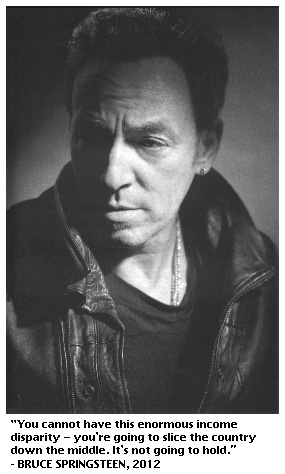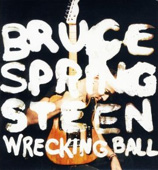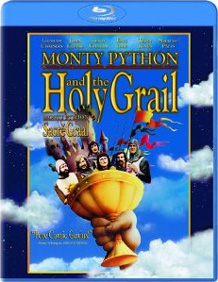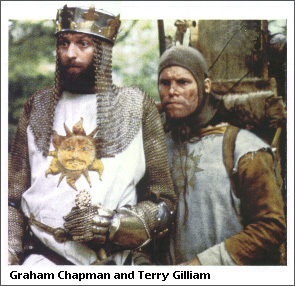![]()
| State of the Union 2012 |
|
![]()
The Boss scans a broken nation on his most turbulent album ever.
Bruce Springsteen
Wrecking Ball
ROCK (Columbia)
By Melissa Maerz in Entertainment Weekly

![]() he recession has been rough on everyone -- except maybe Bruce Springsteen, who's emerged with some good material for his new album. He says Wrecking Ball was inspired by Occupy Wall Street, and even though some of these songs were written before anyone pointed a bullhorn at the banks, he's smart to make that declaration. Whenever America's falling on hard times, his music simply sounds better, his lyrics taking on near-biblical significance. Take 2000's "My City of Ruins," which was originally written to help promote the revitalization of Asbury Park, N.J., but took on an entirely new meaning after September 11, when he began introducing it as "a prayer for our fallen brothers and sisters."
he recession has been rough on everyone -- except maybe Bruce Springsteen, who's emerged with some good material for his new album. He says Wrecking Ball was inspired by Occupy Wall Street, and even though some of these songs were written before anyone pointed a bullhorn at the banks, he's smart to make that declaration. Whenever America's falling on hard times, his music simply sounds better, his lyrics taking on near-biblical significance. Take 2000's "My City of Ruins," which was originally written to help promote the revitalization of Asbury Park, N.J., but took on an entirely new meaning after September 11, when he began introducing it as "a prayer for our fallen brothers and sisters."

|
There's no doubt that die-hard fans will hear a fierce rallying cry on behalf of the 99 percent on Wrecking Ball, the album even sounds like a cross section of America, drawing from folk, gospel, and hip-hop. And on Ball's best moments, Springsteen is fired up enough to borrow a socket wrench and knock out Lehman Brothers' teeth. The working-man paean "We Take Care of Our Own" recalls "Born in the U.S.A." both in its upbeat E Street boogie and in its ironic message, which practically dares some Republican to misinterpret it as a campaign song. Elsewhere, the moving title track (one of the last to feature the late, great Clarence Clemons) stands among his best blue-collar anthems, with a chorus that's the perfect prayer for anyone who's been laid off: "Hold tight to your anger/And don't fall to your fears."
Of course, that message could just as easily apply to football fans. (He actually wrote "Wrecking Ball" about the demolition of Giants Stadium.) That's the problem here: The images are so broad -- every song's got a rising flood or a train of sinners or a dead man's moon -- you'll be dying for a detail that's anchored in the real world, circa 2012. True, Springsteen's ballads have always been made of archetypes like rivers and fast cars. But he's rarely written anything as excruciatingly vague as "You've Got It," which plays like Twenty Questions clues: "Ain't no one can break it/Ain't no one can steal it...... You just know it/When you feel it." Though there are heartfelt tributes to the downtrodden, the only overt reference to the financial collapse comes in "Easy Money," when he scoffs at "all them fat cats." The money may be easy -- but the target is too. B ![]()
|

| The Holy Grail, but Not Of Blu-rays |
|
![]()
We'll always love the movie, but the new edition
of the Monty Python classic disappoints
by Chris Nashawaty in Entertainment Weekly


![]() early 40 years later, it remains one of the all-time great opening scenes in movie history. And one of the silliest. As the clopping sound of hooves approaches, Graham Chapman, playing King Arthur, gallops into the frame...without a horse. Next to him is Terry Gilliam as his hunchbacked lackey, clapping two coconut shells together. It's a cheap gag, but it captures everything that made Monty Python so brilliant. Now debuting on Blu-ray, Monty Python and the Holy Grail (1974, PG, 1 hr., 32 mins.) is by far the best film in this outrageous Oxbridge comedy troupe's canon. Yet it's mind-boggling just how much mileage they've been able to get from what's essentially an esoteric history lesson peppered with juvenile jokes about killer rabbits, shrubberies, and knights who say "Ni." I mean, who would have guessed that three decades later, a low-budget movie starring six guys riffing on tales from ye olde Middle Ages would wind up being adapted into a boffo Broadway musical (Spamalot) playing to packed houses of fanny-pack-wearing tourists?
early 40 years later, it remains one of the all-time great opening scenes in movie history. And one of the silliest. As the clopping sound of hooves approaches, Graham Chapman, playing King Arthur, gallops into the frame...without a horse. Next to him is Terry Gilliam as his hunchbacked lackey, clapping two coconut shells together. It's a cheap gag, but it captures everything that made Monty Python so brilliant. Now debuting on Blu-ray, Monty Python and the Holy Grail (1974, PG, 1 hr., 32 mins.) is by far the best film in this outrageous Oxbridge comedy troupe's canon. Yet it's mind-boggling just how much mileage they've been able to get from what's essentially an esoteric history lesson peppered with juvenile jokes about killer rabbits, shrubberies, and knights who say "Ni." I mean, who would have guessed that three decades later, a low-budget movie starring six guys riffing on tales from ye olde Middle Ages would wind up being adapted into a boffo Broadway musical (Spamalot) playing to packed houses of fanny-pack-wearing tourists?
The Pythons have never been ashamed to admit they're out to separate fans from their hard-earned cash. It's part of their charm. And chances are, if you're a Holy Grail fan, you already have one or more of the many DVD incarnations of the film sitting on your shelf. So should you buy the Blu-ray? It depends. The picture, which frankly always looked a little crummy and washed out, is crisper than ever. But most of the best extras, like the audio commentaries from Gilliam, Terry Jones, John Cleese, Eric Idle, and Michael Palin, are holdovers from the previous Collector's Edition or the three-disc Extraordinarily Deluxe Edition. What's new is a feature on the film's "Lost Animations," hosted by Gilliam, who, in a moment of refreshing candor, says about one of his bits that would up on the cutting-room floor: "If we kept this in the film, it would have been a great success and we wouldn't have to be selling Blu-rays." He then complains about how he mysteriously got roped into contributing to the new extras while none of the other guys did.
That's not entirely true, though. In the other chintzy bonus feature, Jones introduces a meager number of outtakes. While it's fun seeing his face light up as he watches snippets from a film he hasn't seen in 38 years, they're over before you know it. (The best bit is an audio clip of him yelling at a hapless extra on the set.)
I'm always up for an excuse to watch Holy Grail again. It's timeless. But enough with the special editions already. Don't make us use the holy hand grenade. B ![]()
![]() Reader's Comments
Reader's Comments
No comments so far, be the first to comment.
